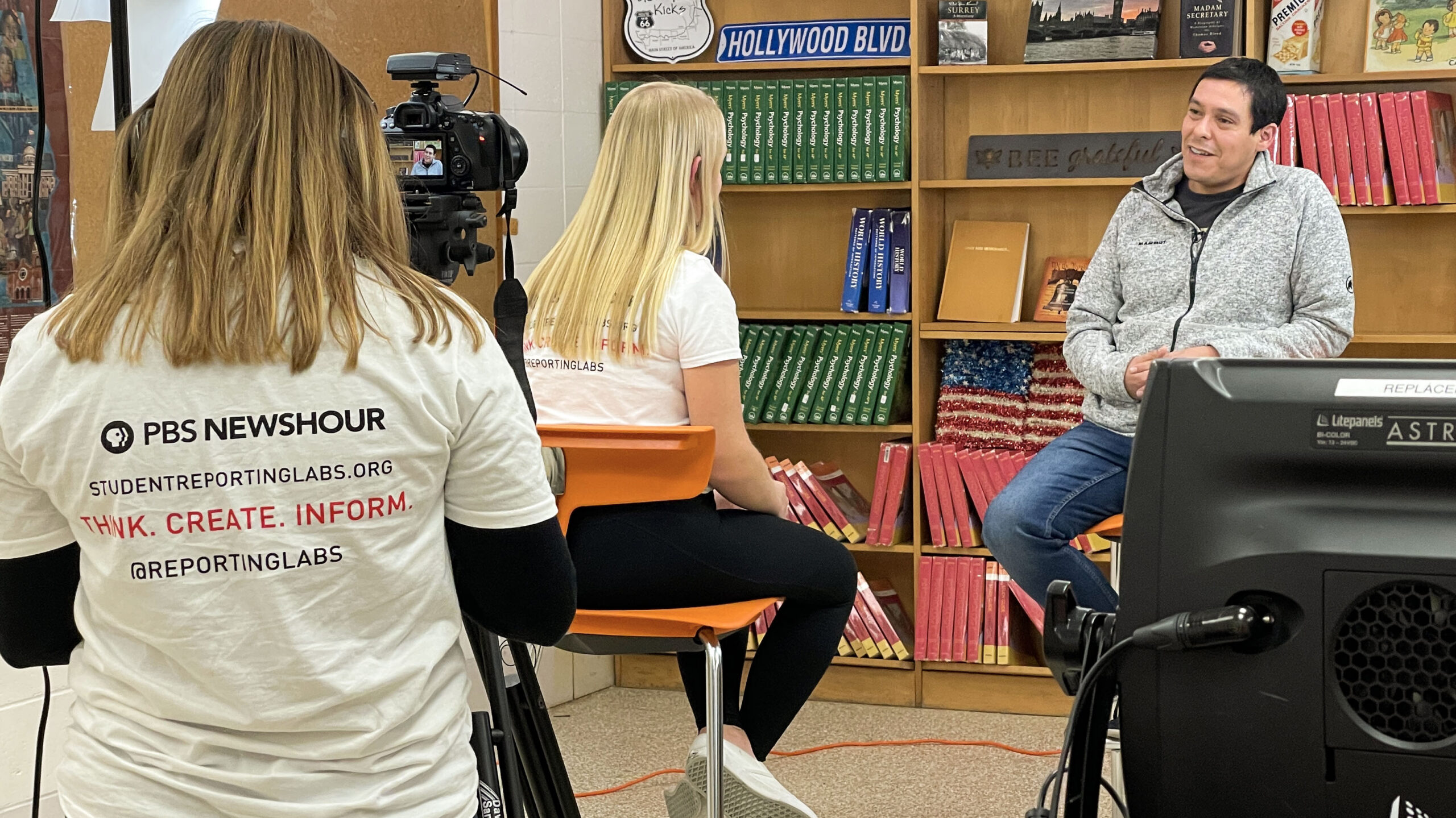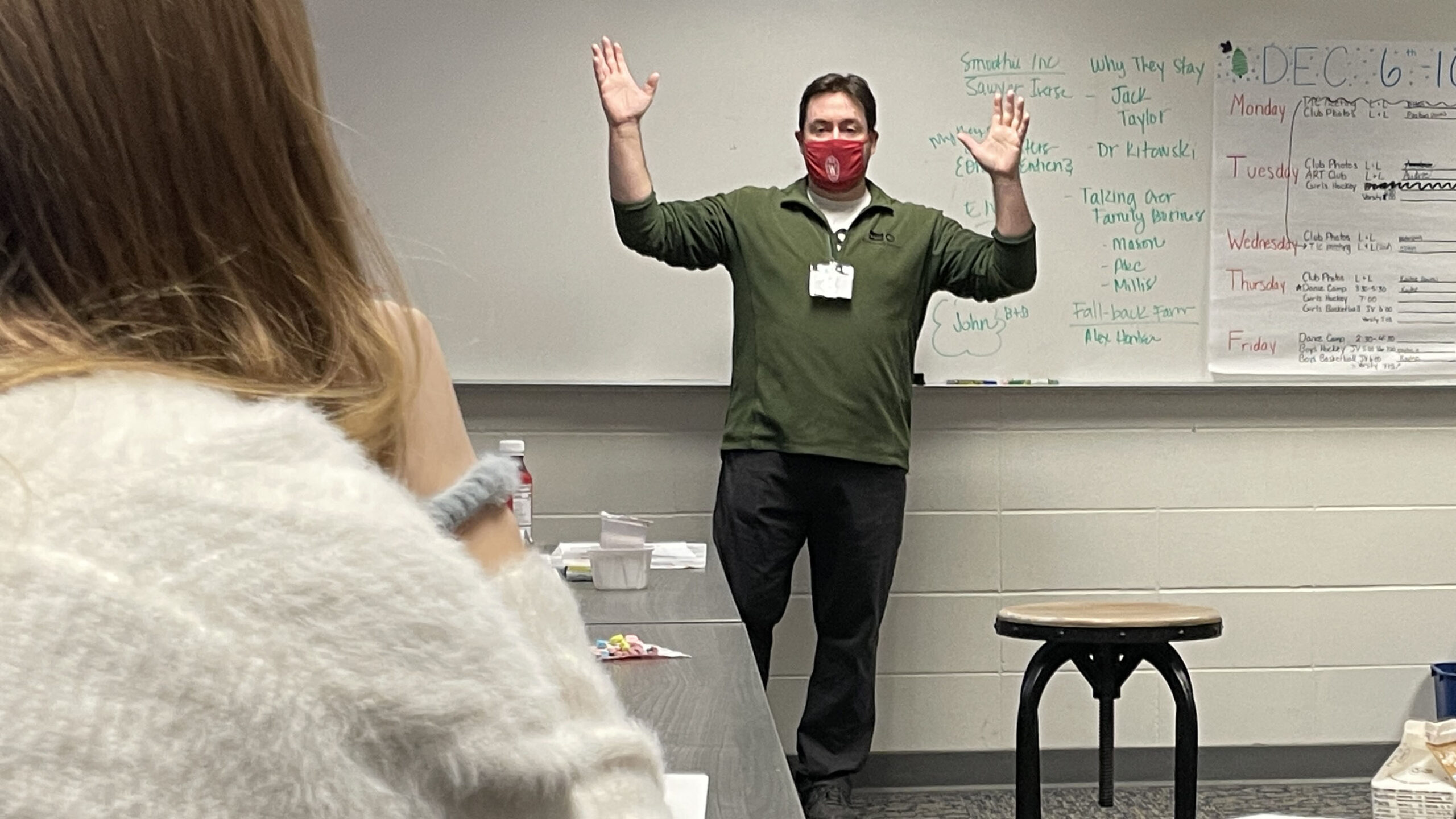Asking good questions and telling powerful stories: A Q&A with Student Reporting Labs partners
January 14, 2022 Leave a Comment
Co-authored with Kim Leadholm
Julie Tiedens is in the business of telling good stories and developing informed citizens. As a Black River Falls High School English teacher and student media advisor for PBS NewsHour Student Reporting Labs, her name is always the final one attached to Student Reporting Labs (SRL) stories as a testament of her behind-the-scenes work with students in every step of the journalistic process.
While not all students who participate in SRL go on to pursue careers in journalism, Kim Leadholm, a 2018 Black River Falls High School alum and current Here & Now student journalist, did. As a student journalist, she’s landed in this very story, asking questions of her former teacher, alongside PBS Wisconsin reporter Zac Schultz.
Schultz is currently working on expanding journalistic coverage of rural issues with the Black River Falls SRL, adding stories that are important to and co-produced with teens, thanks to a grant from the Otto Bremer Trust. The reporting project will take place throughout 2022 and early 2023.
PBS Wisconsin Education joins Leadholm in asking three questions about how PBS Wisconsin and Julie Tieden’s students are working together on this new project, the impacts and how the work informs future possibilities.
Julie Tiedens, Black River Falls High School English teacher and student media advisor for SRL
PBS Wisconsin: How valuable is the Black River Falls High School’s involvement with SRL?
Julie Tiedens: Black River Falls High School’s involvement in SRL is invaluable. As a lab, we have access to so much: timely and interesting prompts and challenges paired with fantastic youth media producers who give students advice during all phases of the production process. As we’ve matured, our connections to PBS Wisconsin have deepened. The news and education departments have offered us their time and knowledge, from field trips to sending professionals into our classroom to demonstrate the process and work with our students. Plus, we’ve had some incredible opportunities come our way: students have been selected for the annual SRL academy, we’ve traveled to Isle Royale and interviewed researchers about their famous wolves, and we’ve interviewed the Secretary of Education, to name a few.
PBS Wisconsin: What kind of skills are your students learning in SRL’s class?
Tiedens: First and foremost, I’m focusing quite a bit on media literacy and detecting bias. During the first trimester, we work on that bias piece and then continue to exercise the skills as we produce our own work. We’re also learning how to get information from both primary and secondary sources, ask important questions, listen critically to those answers, and develop stories that are important to our audience.
Learning how to use the equipment and pair visuals and sounds with their scripts is also on the agenda. In the end, I don’t expect most students will leave the staff wanting to become journalists, but I know they’ll be better equipped to be discerning and informed citizens. Plus, they’ll have some valuable communication skills that can be applied to so many careers.
PBS Wisconsin: How will the experiences in this class and the SRL program serve all students and their career paths, whether in journalism or not?
Tiedens: Learning to report on stories requires you to break out of that shell so many of us have. A lot of students — and adults — are shy, or they’re not quite sure what questions to ask to get the information they need. I think SRL really digs into not just writing and research skills, but it also asks students to develop the skills they need to get answers face-to-face. They look at body language, learn to listen, learn to be critical about what they’re hearing … and begin to value the power of silence a bit. That’s valuable in life, period.
Many of my students end up graduating and finding out their employers can use someone who knows their way around a camera and some video editing software. They leave high school with skills that can benefit small and medium-sized businesses that want someone to tap on for small or ongoing projects, especially in social media.
Zac Schultz, PBS Wisconsin reporter
PBS Wisconsin: What has it been like to interact with students in the SRL program in Black River Falls?
Zac Schultz: It has been a lot of fun to work with the high school students. They are bringing their own experience and perspective to this project. One element I want to focus on is what it’s like to be young and living in a rural area. Naturally, each of the students is an expert on this topic, even if they don’t realize it yet. I’ve been very impressed with how attentive they’ve been when I’ve been in class, both listening and then providing valuable feedback and ideas.
PBS Wisconsin: How is the students’ input in some of the work you are reporting on valuable?
Schultz: I hope the students will be involved in every step of the process. I want them to feel ownership over the final product. I am working with them to find people to interview, and then figure out how all the individual stories interact to create one larger story. There’s no way I’d be able to find all these people to interview on my own, I would always need local people to help guide me, and the students are providing that guidance.
PBS Wisconsin: What are you trying to help the students learn?
Schultz: Beyond learning basic lessons about journalism, we will focus on learning more about the value of talking to your neighbor and learning someone else’s story. I don’t know if any of these students will enter the field of journalism, but there are still life skills that can be learned about how to ask a good question and thinking more broadly about your community that carry over into any profession and just being a good citizen.
Kim Leadholm, Here & Now student journalist
PBS Wisconsin: What was the best part of participating in the SRL when you were in high school?
Kim Leadholm: The best aspect of participating in the Student Reporting Labs class was the stories we got to work on. During my junior year of high school, our class was able to visit Isle Royale National Park while working on a story about the wolf and moose populations on the island. During my senior year of high school, our class was able to work on a story about a local organization helping combat drug addiction in the community. This course provided students the ability to work on stories that we found interesting and were relevant to our local community, which was something not available in any other class.
PBS Wisconsin: How did SRL help you decide what to pursue in college and a career?
Leadholm: Before taking the SRL course, I had never considered pursuing a career in journalism. I was planning to work in the medical field. My experiences in the SRL class introduced me to visual storytelling, showing me what I hope to pursue in the future. I fell in love with telling stories in our community about topics that truly matter in a fun and creative way.
PBS Wisconsin: How did your efforts in the SRL class, your experiences and your connections help with the work you are currently doing with PBS?
Leadholm: Not only was I able to meet some of the Here & Now staff members during high school through the SRL course, our class was also given the opportunity to visit the set of the show. This was a fascinating experience that reaffirmed my interest to pursue a career in journalism. I learned valuable writing skills and an understanding of video production that other students don’t have the chance to experience without this class. In SRL, I was taught the importance of listening to my community members, hearing what they care about, and reporting on what is relevant to them. Without this class, I don’t think I would have had any of these skills.
—
Jon Miskowski, PBS Wisconsin’s Director of Television, affirms the importance of this collaboration. “Serving the people of Wisconsin, covering the issues that matter, telling Wisconsin stories, innovating to inspire life-long learning at home and in the classroom: these are core to our mission. We are grateful for support from the Otto Bremer Trust to advance this mission. Otto Bremer Trust’s community investments including public media throughout the four-state area demonstrate a long and thoughtful commitment to building assets in the community. Their support of this collaboration expands PBS Wisconsin’s coverage of issues by adding youth voice from throughout our state and provides new assets to Wisconsin classrooms to support students as thoughtful creators and consumers of media. Combining public media and youth voice in this way enriches both our services and education outcomes in Wisconsin classrooms.”
 Passport
Passport






